MercoPress. South Atlantic News Agency
Tag: Jerome Powell
-
Saturday, December 4th 2021 - 09:10 UTC
Inflation beats the Fed: the word “transitory” eliminated from forecasts
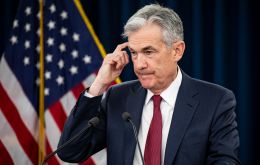
Federal Reserve policymakers finally acknowledge the increasing risk of more persistent inflation in months ahead and thus the word “transitory” has been eliminated from the inflation forecasts.
-
Wednesday, December 1st 2021 - 08:56 UTC
US Fed chairman warns inflation will stay around longer than expected

Jerome Powell, chairman of the US Federal Reserve, the Republican who has just been entrusted by President Joseph Biden for another term in office, Tuesday told Congress inflation might be here to stay a while longer, in the face of the Omicron C19 variant.
-
Tuesday, November 23rd 2021 - 20:01 UTC
Biden endorses Powell for yet another term as Federal Reserve head
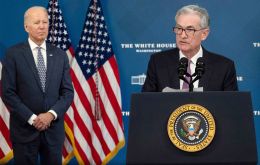
US President Joseph Biden has announced he wanted Republican lawyer Jerome Powell to stay at the helm of the United States Federal Reserve (Fed) for a second four-year term.
-
Monday, August 30th 2021 - 07:23 UTC
US markets at new highs, following on the Fed's chair announcement
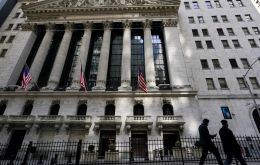
Wall Street climbed on Friday while S&P and Nasdaq reached new historic highs for the fourth time in the week following on statements from Fed chairman Jerome Powell at the Jackson Hole symposium when he anticipated a moderate, non-aggressive calendar reduction in the purchase of bonds.
-
Saturday, August 21st 2021 - 09:15 UTC
Fed could announce this week the assets purchase reduction calendar
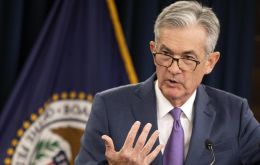
The United States Federal Reserve could begin withdrawing economic stimuli sometime in the next four months and advances of such a program could be anticipated this week at the Jackson Hole central bankers meeting 26/27 August.
-
Thursday, July 29th 2021 - 07:58 UTC
Fed leaves rates unchanged but admits inflation could force a change of policy

The United States Federal Reserve kept interest rates unchanged, close to zero, despite an inflation spike during June when it soared to an annual 5,4%, its highest in thirteen years.
-
Thursday, June 24th 2021 - 03:04 UTC
Dollar skids as Fed officials testify that stimulus tightening is “still quite a way off”
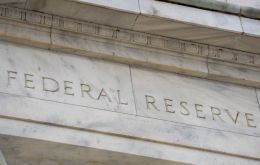
With U.S. Federal Reserve officials including Chair Jerome Powell reaffirming that tighter monetary policy was still some way off, the US dollar slipped against major peers on Wednesday.
-
Saturday, May 1st 2021 - 08:04 UTC
US dollar stays on a slump in Uruguay
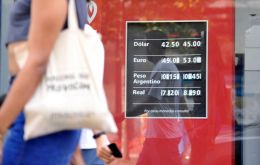
The US dollar kept its downward trend against the Uruguayan peso Friday, closing at US $ 1 = UR $ 43.8 for interbank operations, it was reported. In Brazil, the exchange rate fell 0.7% Friday and stood at 5.44 R$ per dollar.
-
Thursday, March 18th 2021 - 08:51 UTC
Fed sees no interest rate hikes likely through 2023; US GDP expected to increase 6,5% in 2021
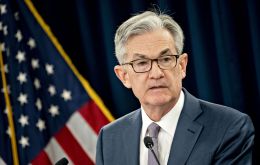
The Federal Reserve on Wednesday sharply ramped up its expectations for economic growth but indicated that there are no interest rate hikes likely through 2023 despite an improving outlook and a turn this year to higher inflation.
-
Monday, October 19th 2020 - 09:49 UTC
IMF and top central bankers agree global economic recovery needs more public spending

The International Monetary Fund said more public spending will be needed to complete the economic recovery from coronavirus, joining central bankers and finance leaders who are urging governments to set aside fears about mounting debt for now.
